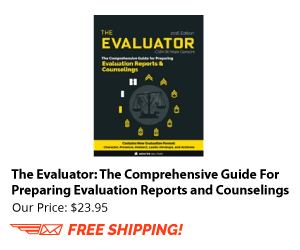In order to properly render a Relief for Cause evaluation report a leader must know the definitions associated with the report and how they apply to the process.
Definitions
In order to understand the purpose of relief, let’s examine a few definitions that may be useful in determining if a Relief-for-Cause Report is warranted.
Inefficiency
Demonstration by an individual which reflects an NCO’s or Officer’s inability to perform the duties and responsibilities of his rank or MOS/Functional Area. It is imperative that the commander weigh all factors before making a decision concerning inefficiency. These factors may include:
1. Has the NCO/Officer recently been reclassified into his current MOS?
2. Has the individual been improperly assigned outside his MOS into a field that requires extensive or special training?
3. Is there a personality conflict between the individual and a member of the command requesting the relief?
Misconduct
This refers to wrongful or improper conduct which does not necessarily involve the commission of an offense considered punishable under the UCMJ.
Referral
The process of formally providing a completed evaluation report to a rated Soldier for review and acknowledgment. Referral is accomplished by the senior rater. This procedure ensures the rated Soldier is advised they are permitted to comment on adverse information contained in the evaluation or addenda before it becomes a matter of permanent record. The referral may be accomplished face-to-face, but a written referral method is recommended when the Soldier is not present to accomplish the process in person. This provision does not apply to NCOERs, however it is applicable to NCOER addenda processes.
Relief
The removal of a rated Soldier from an assigned position based on a decision by a member of the Soldier’s chain of command/supervisory chain that his or her personal or professional characteristics, conduct, behavior, or performance of duty warrant his or her removal from the position in the best interests of the U.S. Army. Relief actions require the completion of a “Relief for Cause” OER or NCOER. A relieved officer or NCO cannot prepare or submit an evaluation report on their subordinates during the suspension period leading up to the relief or after the relief is final.
Willful Neglect
This is related to misconduct and involves an action or actions committed with reckless disregard of consequences.
Note: Please keep in mind that most of the following information is not regulatory in nature. This information is to be used only as a guide to provoke thought and understanding of the issue. Before directing or initiating a Relief-for-Cause it is imperative that you contact one of the agencies listed under Local Sources, or follow the procedures established by your local command. The procedures concerning the relief of an individual may vary from unit to unit.
Counseling
As I have previously stated, proper and professional counseling is imperative and provides clear and direct guidance to NCOs/Officers. If the unit enforces a solid counseling program many problems will be solved at the lowest level. Moreover, if the counseling does not rectify the problem it will provide background to the chain-of-command in determining if a Relief-or-Cause Report is warranted. This counseling may not necessarily be negative; in fact it is possible that the counseling may reflect that the Soldier’s past performance has been satisfactory or even outstanding.
The record of counseling should be used to examine the whole Soldier and possible reasons that may have sparked the interest in a Relief-for-Cause. In cases of clear misconduct, willful neglect, or inefficiency past performance may not necessarily be a factor that is considered.
With respect to a relief, AR 623-3 and AR 600-20 discuss the relief process and AR 600-20 specifically mentions the 30 day counseling period (rating period) be established prior to the relief of the individual. The purpose of this restriction is to allow the rated individual sufficient time to react to performance counseling. This requirement can be waived by a general officer in clear-cut cases of misconduct.
Here are some suggestions you may consider when conducting the 30-day (weekly counseling sessions). Please keep in mind that the counseling may be done by the individual’s rater or by the unit commander. In my opinion, the unit commander should conduct the counseling with the rater present. My reasoning for this is that a Relief-for-Cause Report is a serious event and a commander should be involved personally if the potential of relief exists for one of his/her Leaders. In addition, I believe that it shows the chain-of-command is concerned about its Leaders and takes the matter of relief seriously. Also, a commander is slightly removed from the situation and should be able to make decisions concerning the case without prejudice. Again, this is only my opinion, but I think it is important to exercise caution and ensure fairness to the individual involved.
For More Information on Relief for Cause Reports consdier the following resources:
Rater Quick NCOER/OER Software
The Evaluator “the comprehensive guide to preparing evaluation reports and counselings”
Please Read! Help Us Help Others!
If you think this site is useful please tell your peers, subordinates, and superiors. Also we are always looking for examples, classes, briefings, SOPs, templates and other information we can share for free in the ASKTOP.net Armsroom. Please help us help others by sending your ARMS ROOM stuff to: mark.gerecht@mentorinc.us













Comments
John
Is a relief of cause NCOER at the company commanders level to initiate it. Can a company commander stop and say no to a relief of cause NCOER. There telling my command and 1sgt to write me a relief of cause NCOER. Does he have the right to say no if he does not believe it should be written. Thanks
Mark Gerecht
This response is provided based on the information you shared and should not be used as the sole source for making a decision. You should seek guidance from the chain of command, IG, JAG or other certified agencies before making any decisions. How you chose to use this information is totally up to you and is your sole responsibility.
Any person in the rating chain can direct a relief. However a relief can also be directed by a person outside the rating chain. See AR 623-3 and DA PAM 623-3 as they relate to relief for cause actions. Basically if the relief is directed by an individual outside the rating chain it must be so annotated and I believe a relief memo must also be generated.
Check out our YOUTUBE Channel as it has numerous videos on relief for cause actions.
CHECKOUT OUR YOUTUBE CHANNEL: Mentor Military https://www.youtube.com/channel/UCj0IXu7SmA2wLoPrNAUfSZA
Hope this helps to some degree.
FOLLOW US
Facebook/Twitter/Newsletter
Facebook: https://www.facebook.com/MentorMilitary/
Facebook: https://www.facebook.com/Asktop/
Newsletter: http://eepurl.com/bjcYH
YOUTUBE: Mentor Military https://www.youtube.com/channel/UCj0IXu7SmA2wLoPrNAUfSZA
Twitter: https://twitter.com/AskTOP
Websites:
http://www.MentorMilitary.com
http://www.Asktop.net